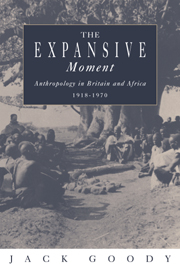Book contents
- Frontmatter
- Contents
- Introduction
- 1 The economic and organisational basis of British social anthropology in its formative period, 1930–1939: social reform in the colonies
- 2 Training for the field: the sorcerer's apprentices
- 3 Making it to the field as a Jew and a Red
- 4 Personal and intellectual friendships: Fortes and Evans-Pritchard
- 5 Personal and intellectual animosities: Evans-Pritchard, Malinowski and others
- 6 The Oxford Group
- 7 Some achievements of anthropology in Africa
- 8 Personal contributions
- 9 Concluding remarks
- Appendix 1 Changing research schemes
- Appendix 2 Towards the study of the history of social anthropology
- Notes
- List of references
- Index
5 - Personal and intellectual animosities: Evans-Pritchard, Malinowski and others
Published online by Cambridge University Press: 30 September 2009
- Frontmatter
- Contents
- Introduction
- 1 The economic and organisational basis of British social anthropology in its formative period, 1930–1939: social reform in the colonies
- 2 Training for the field: the sorcerer's apprentices
- 3 Making it to the field as a Jew and a Red
- 4 Personal and intellectual friendships: Fortes and Evans-Pritchard
- 5 Personal and intellectual animosities: Evans-Pritchard, Malinowski and others
- 6 The Oxford Group
- 7 Some achievements of anthropology in Africa
- 8 Personal contributions
- 9 Concluding remarks
- Appendix 1 Changing research schemes
- Appendix 2 Towards the study of the history of social anthropology
- Notes
- List of references
- Index
Summary
Evans-Pritchard's friendship with Fortes was undoubtedly motivated by the strong intellectual attraction the two men had for one another. But the alliance also very much suited Evans-Pritchard's battle with Malinowski. Part of his dependence on intellectual discussion with Fortes reflects his isolation from the group at the London School of Economics, or ‘£.S.D.’ as he sometimes called it, referring to Malinowski's success in attracting funds for research. Although at times he got on with Firth, he suspected him for his attachment to Malinowski, as well as for what in Evans-Pritchard's view was his social conformism in contrast to his own romantic detachment from the world. Some, like Richards, he never spoke to, at least after an initial friendship. If anything he tended to cleave to the old school, the Seligmans, Balfour, Rattray, Driberg.
He was greatly affected by the death of Seligman, who had helped him start his fieldwork in the Sudan, who had himself led an independent scholarly existence based on inherited wealth and who as a fellow Professor at the School had had a raw deal, as Evans-Pritchard saw it, from Malinowski. He regarded Seligman as much more than a supervisor, rather as a close friend and as a shield against Malinowski. In the context of the production of Seligman's festschrift, the care of which he handed over to Fortes when he left to teach sociology at Cairo in 1932, he wrote that ‘he (B.M.) may try and do us all down but I think he fears the Sligses too much’. But Seligman grew tired of the struggle with Malinowski and handed in his resignation.
- Type
- Chapter
- Information
- The Expansive MomentThe rise of Social Anthropology in Britain and Africa 1918–1970, pp. 68 - 76Publisher: Cambridge University PressPrint publication year: 1995



